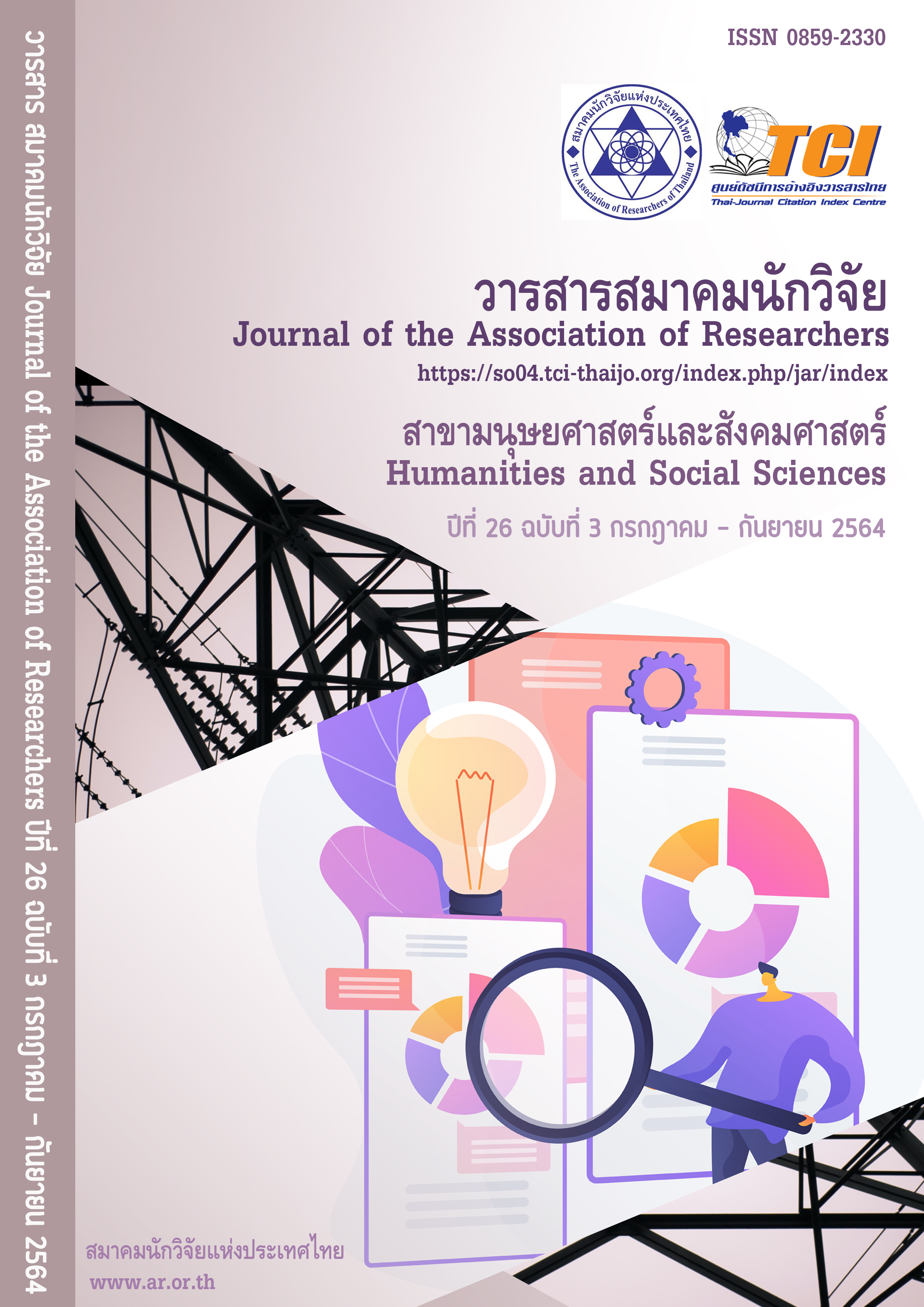Online game application format to enhance teaching and learning in the graduate course Sukhothai Thammathirat Open University
Main Article Content
Abstract
This research article has a purpose to study 1. To study the problem condition of teaching through smartphones. 2. To analyze the content and analyze the demand for online games to enhance teaching through smartphones. The sample group used in this research were students of Sukhothai Thammathirat Open University registered for the course 91727 Administration and Communication for Agricultural Extension and Development In the second semester of the academic year 2020, the number of 39 students and experts in the development of teaching and learning models with an online game application format, totaling 11 people. The tools used in the research consisted of group conversation recordings. Interview recording form for students Student needs assessment questionnaire and Opinion interview form for branch teachers. The data were analyzed by using the Index of Conformity (IOC), the determination of percentage, mean ( ) and standard deviation (S.D.). The results showed that 1) The problem was caused by the students who did not understand the theory. Students cannot refer to the theory. 2) The content that the students want to use in the game production is Unit 10, 4, and 9. As for the content teacher, the content should be used in Units 2, 4, 5, 6, 9, 11, and 12 to produce a game. and analysis of student and teacher needs for content for mobile application development. in the graduate course Sukhothai Thammathirat Open University consists of 1) Games should be played individually or in groups. Or should it be both as a single and a mixed group? 2) Setting conditions or privileges need help when unable to answer in-game. 3) Students want to know the scores and ranking of the games and explanation/answer Games should be fun along with learning.
Article Details
บทความที่ปรากฏในวารสารนี้ เป็นความรับผิดชอบของผู้เขียน ซึ่งสมาคมนักวิจัยไม่จำเป็นต้องเห็นด้วยเสมอไป การนำเสนอผลงานวิจัยและบทความในวารสารนี้ไปเผยแพร่สามารถกระทำได้ โดยระบุแหล่งอ้างอิงจาก "วารสารสมาคมนักวิจัย"
References
ชูพงษ์ ชูเสมอ. (2553). ความแตกต่างระหว่าง Software, Application, และ Program.
มหาวิทยาลัยสุโขทัยธรรมธิราช. (2560). เอกสารชุดการสอนชุดวิชา 91727 การบริหารและการสื่อสารเพื่อการส่งเสริมและพัฒนาการเกษตร. (หน่วยที่ 1-15,พิมพ์ครั้งที่1) นนทบุรี:โรงพิมพ์มหาวิทยาลัยสุโขทัยธรรมธิราช.
วิลาวัณย์ อินทร์ชำนาญ. (2561). การพัฒนาสื่อการเรียนรู้ประเภทเกม เพื่อให้ความรู้ในเรื่องกฏระเบียบและข้อปฏิบัติในศูนย์ฝึกและอบรมเด็กและเยาวชน. มหาวิทยาลัยธุรกิจบัณฑิตย์.
วิลาวัลย์ อินทร์ชํานาญ และกรุณา แย้มพราย. (2557). งานวิจัยสาระบันเทิงจากกิจกรรมในเกมการประชุมวิชาการระดับประเทศด้านเทคโนโลยีสารสนเทศ ครั้งที่ 7 เชียงใหม่:สถาบันเทคโนโลยีพระจอมเกล้าเจ้าคุณทหารลาดกระบัง. 26-29 ตุลาคม 2559.ศรัญญา
ไพรวันรัตน์. (2554).การศึกษาปัจจัยทำนายและแนวทางการปรับลดพฤติกรรมติดเกมออนไลน์ของวัยรุ่นในจังหวัดชลบุรี. ปรัชญาดุษฎีบัณฑิต สาขาวิชาการศึกษาและการพัฒนาสังคม. มหาวิทยาลัยบูรพา.
สกุล สุขศิริ. (2550) ผลสัมฤทธิ์ของสื่อการเรียนรู้แบบ Games – Based Learning สารนิพนธ์ การพัฒนาทรัพยากรมนุษย์และองค์การ, วิทยาศาสตรมหาบัณฑิต คณะพัฒนาทรัพยากรมนุษย์ สถาบันบัณฑิตพัฒนบริหารศาสตร์.
สำนักงานคณะกรรมการการศึกษาขั้นพื้นฐาน. (2555). คู่มืออบรมปฏิบัติการบูรณาการใช้คอมพิวเตอร์พกพา (Tablet) เพื่อยกระดับการเรียนการสอน. พิมพ์ครั้งที่ 1. กรุงเทพมหานคร: สำนักเทคโนโลยีเพื่อการเรียนการสอน.
สำนักงานสถิติแห่งชาติ.(2561). สำรวจการใช้เทคโนโลยีสารสนเทศและการสื่อสารในครัวเรือน พ.ศ. 2561. http://www.nso.go.th/sites/2014/Pages/สำรวจ/เทคโนโลยีสารสนเทศ/เทคโนโลยีในครัวเรือน.aspx ค้นหาเมื่อวันที่ 3 กุมภาพันธ์ 2563.
สุชาดา พลาชัยภิรมย์ศิล. (2554). แนวโน้มการใช้โมบายแอพพลิเคชั่น. วารสารนักบริหาร.
Atkins, S., & Jones, D. (2004). Consideration for learning design.
Betz, N. E. (1995). Counseling Uses of Career Self‐Efficacy Theory.The Career Development Quarterly, 41(1), 22-26.
Mellander, K. (1993).The power of learning. United States of America: RR Donnelley & Sons Company.
Piaget, J. (1986). The construction of reality in the child. N.Y.: Ballantine Books.
Prensky, M. (2001). Digital Game-Based Learning. New York: McGraw-Hill.
Translated Thai References
Chusamer. C. (2010). The difference between Software, Application, and Program. (in Thai)
Inchamnan. W. (2018). Development of game learning media. To provide knowledge on rules and regulations in the Child and Youth Training and Training Center. Dhurakij Pundit University. (in Thai)
Inchamnarn W.& Yamprai. K. (2014). Infotainment research from game activities [Abstract, Summary of Research]. The 7th National Academic Conference on Information Technology, Chiang Mai: King Mongkut's Institute of Technology Ladkrabang. 26-29 October 2016. (in Thai)
National Statistical Office. (2018). Survey on the use of information and communication technology in the household, 2018. http://www.nso.go.th/sites/2014/Pages/Survey/Information Technology/Household Technology.aspx Searched on February 3, 2020. (in Thai)
Office of the Basic Education Commission. (2012). Training Manual for Integrating the Use of Portable Computers (Tablet) to enhance teaching and learning. First Edition, Bangkok: Office of Technology for Teaching and Learning. (in Thai)
Praiwanrat. S. (2011). A Study of Predictive Factors and Guidelines for Reducing Online Game Addiction Behaviors of Adolescents in Chonburi Province. Doctor of Philosophy Department of Education and Social Development. Burapha University. (in Thai)
Plachaipiromsil. S. (2011). Trends in the use of mobile applications. Executive Journal. (in Thai)
Suksiri. S. (2007) The Achievement of Games-Based Learning Media, Thesis Material, Human Resources and Organization Development, Master of Science. Faculty of Human Resource Development National Institute of Development Administration. (in Thai)
Sukhothai Thammathirat Open University. (2017). Documents on Teaching Series 91727. (in Thai) Administration and Communication for Agricultural Extension and Development. (Unit 1-15, First Edition) Nonthaburi: Sukhothai Thammathirat University Printing House. (in Thai)


